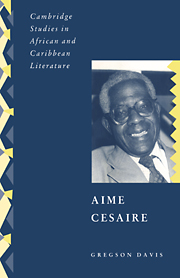Book contents
- Frontmatter
- Contents
- Preface
- Acknowledgements
- Chronology
- Introduction
- 1 From island to metropolis: the making of a poet
- 2 Exploring racial selves: “Journal of a Homecoming”
- 3 Inventing a lyric voice: the forging of “Miracle Weapons”
- 4 Lyric registers: from “Sun Cut Throat” to “Cadaster”
- 5 The turn to poetic drama
- 6 The return to lyric: “me, laminaria …”
- Epilogue
- Notes
- Bibliography
- Index
3 - Inventing a lyric voice: the forging of “Miracle Weapons”
Published online by Cambridge University Press: 29 October 2009
- Frontmatter
- Contents
- Preface
- Acknowledgements
- Chronology
- Introduction
- 1 From island to metropolis: the making of a poet
- 2 Exploring racial selves: “Journal of a Homecoming”
- 3 Inventing a lyric voice: the forging of “Miracle Weapons”
- 4 Lyric registers: from “Sun Cut Throat” to “Cadaster”
- 5 The turn to poetic drama
- 6 The return to lyric: “me, laminaria …”
- Epilogue
- Notes
- Bibliography
- Index
Summary
I do not often have occasion to re-read my poems. They have traced the pathway of my life, have circumscribed and defined my life.
Aimé CésaireCésaire's actual return to his native island (as distinct from his fictional “return” enacted in the pages of Cahier) plunged him at once into a maelstrom of intense political and intellectual activity. The monsters of the Second World War had already been unleashed (hostilities broke out, in fact, as he was making the homeward journey by ship), and the Martinique to which he came home fell temporarily under the sway of the infamous Vichy regime, which was in open collaboration with the Nazi government. The society to which he now sought to commit his passion and energy was thus subject to the double oppression of colonialism and fascism. Not content to be an inspired teacher at the Lycée Schoelcher, where he himself had previously been a prize pupil, he soon took his place at the fore-front of the local artistic and political scene. His emergent lyric voice, then, was forged in the heat of a traumatic global convulsion and its aftermath, when the educated elite of the colonies was both reacting to the apparent debacle of European culture and intent on supplanting, if not destroying once and for all, the colonial order. Before attempting to illustrate these developments, it may be useful to sketch very briefly the political and social circumstances in which Césaire invented his distinctive lyric voice.
- Type
- Chapter
- Information
- Aimé Césaire , pp. 62 - 91Publisher: Cambridge University PressPrint publication year: 1997



